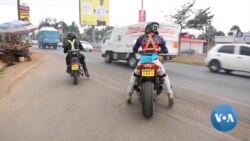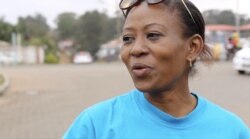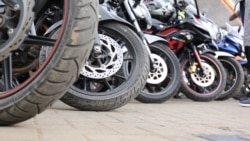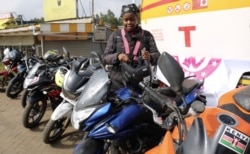The boda bodas and other motorcycles darting through the Kenyan capital’s crowded streets usually have men holding the grips. But a new club encourages women to take control for themselves.
“Bikes are special in every way. … The fact that they don't stop in traffic. The fact that they give you that rush, the adrenaline rush — it just makes you feel, ‘Wow!’” said Patience Mehta, a biker, farmer and administrator.
In June, Mehta started a club to help more women share that experience. Piki Dada, which means “motorbike sisters” in Swahili, now represents roughly 40 women on wheels.
“We like to motivate each other,” she said. “We come together. We talk together. We live together. We ride together.”
Piki Dada is among a handful of clubs — including the Throttle Queens, the Inked Sisterhood and Heels of Steel — that have sprung up in Kenya to offer support, training, group rides and camaraderie for female riders.
Motorbike registrations rising
Tax incentives and a desire for more efficient transportation have revved up interest in motorbikes in general. Registrations jumped from almost 16,300 in 2007 to more than 191,000 a decade later, according to Kenya’s National Bureau of Statistics.
Mehta says businesses also are paying more attention to women, offering more feminine riding gear and smaller, lighter bikes.
“Most of the gear is usually manly, but of late, they’ve started bringing in riding gear that is also fitting to women,” Mehta said. “The bike sizes also are not feminine. … So, we have to import bikes. I have a problem also getting bikes where my feet touch the ground.”
The petite Mehta found a fit with an Indian-made Hero Karizma ZMR.
Navigating obstacles
Mehta and other Piki Dada riders point out more challenges. One is the safety risks posed by cars, so the club promotes defensive riding among its members.
“We find that in some areas where bikes are not very common, they’re not very cautious about us. … You find someone who’s just coming into your lane,” said Demaris Mainis, an internet tech security analyst. In her three years of riding, she has learned defensive skills and has come to favor highways, which she once feared because of higher speeds, over the unpredictability of city traffic.
Another challenge is what Mehta considers an outdated mindset in the East African nation.
“People thinking it’s just a man’s sport,” she said of motorbiking. ... "So, we come out, we show ourselves. … We believe that everyone who sees us, everyone who speaks to us, everyone who knows us also will get encouraged.”
Through talks and training, Piki Dada supports women who drive motorbikes — not just to maneuver in heavy traffic but also to help them steer past sexist stereotypes.
Club members work to educate the public, mentoring girls and women, going into schools to offer social support, and arranging weekend rides outside the city.
“It’s a way to set yourself free,” Maina said. “Every time I ride, I feel like I am able to put everything aside and just concentrate on the road and to have a good time. It’s just very special to me.”
Any woman is eligible to join Piki Dada, as long as she has access to a registered bike, Mehta said, adding that “oomph,” or enthusiasm, also is required.
“If you don’t have that energy, then you will not be able to keep up,” Mehta said. "It’s a way of life. It’s the way Kenya is going.”
This report originated in VOA’s Swahili Service












